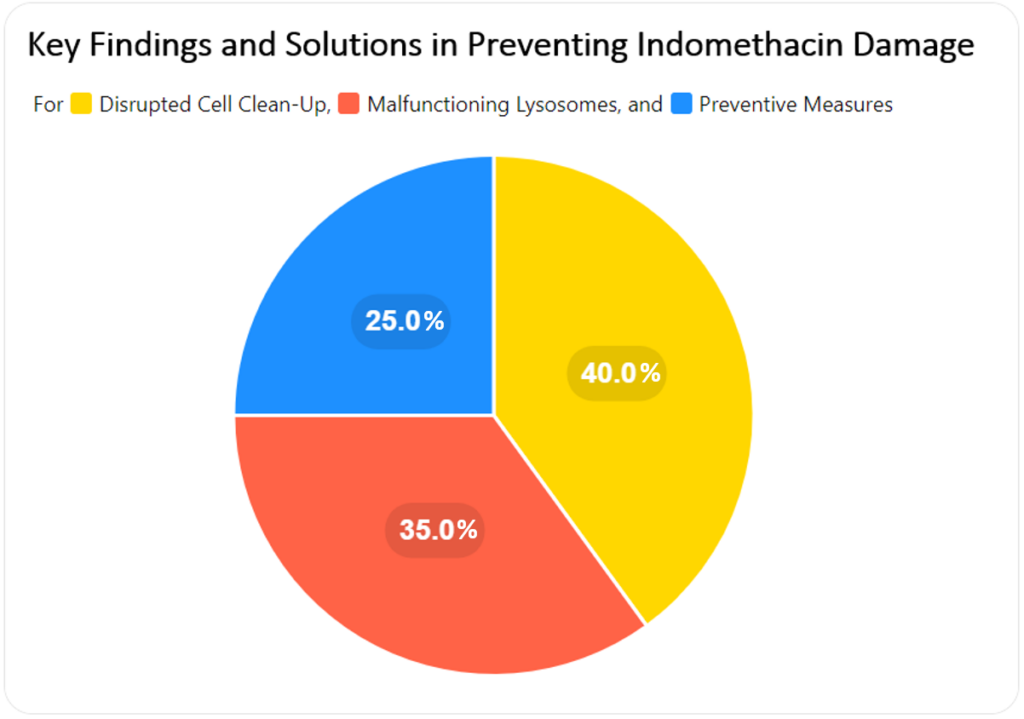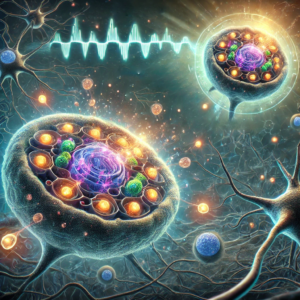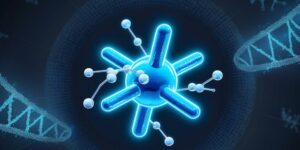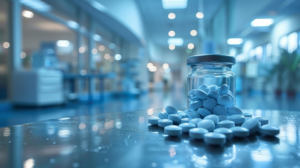How Rapamycin and Fasting Help Prevent Indomethacin Damage to the Gut

Rapamycin (Rapa) helps lessen indomethacin damage to the small intestines. Image by Darko Djurin
- Nonsteroidal anti-inflammatory drugs (NSAID) can mess up tummies and cause ulcers. The drug rapamycin (Rapa) and fasting may protect against indomethacin damage.
- NSAID pain meds can throw off the body’s natural cleaning process (autophagy), increasing intestinal damage risks.
- Scientists ran tests on replica cells and mice to double-check their results.
- This trial could help find new ways to prevent gastrointestinal issues caused by pain meds.
How Rapamycin Protects from Indomethacin Damage
Pain meds like ibuprofen can be great for aches and pains, but too much is harmful to health. NSAIDs can wreak havoc with your gut, causing stomach sores like ulcers in the small intestine. A study from Japan looked into not only why this happens but also how to prevent it.
They focused on two things: the drug rapamycin and skipping meals (fasting). Their findings suggest these interventions might help protect your gut from indomethacin damage. They keep tiny cleaning machines (Lysosomal V-ATPase integrity) in the cells working. This exciting research may lead to new ways to avoid painful gut problems triggered by pain meds.

How Scientists Are Fighting Pain Med-Linked Gut Ulcers
NSAIDs have come a long way in treating mild to moderate aches and pains. Despite the plusses, these meds can also lead to unwanted side effects on the gut. This 2023 research looks at why NSAIDs cause ulcers in the small intestine. It also explores some likely solutions to this age-old issue of indomethacin damage.
Science Experiments
Dish Tests: Scientists grew tiny gut cell replicas (called IEC6 cells) in dishes. They then gave them indomethacin, the pain medication, to see how they reacted inside the cells. This experiment helped them understand how NSAIDs affect things like cleaning processes and protein levels.
Mouse Models: Scientists also used mice to see how indomethacin caused ulcers in their small intestines. They gave the rodents rapamycin, ensuring they skipped meals (fasting) before treatment.
The results of these interventions seemed to reduce the formation of ulcers significantly.
The Findings: Causes Behind Indomethacin Damage
This section looks a little closer at what’s happening at the cellular level. It shows how some pain drugs disrupt a natural cleaning process in cells, leading to issues. The study also reveals some highly promising solutions that may help prevent these problems.
This table summarizes the most significant findings and solutions:
| Finding | Description | Potential Solution |
|---|---|---|
| Disrupted Cell Clean-Up | Indomethacin interferes with autophagy (the cell’s natural cleaning process). | Rapamycin or Fasting |
| Malfunctioning Lysosomes | Pain medications weaken cleaning enzymes by reducing lysosomal acidity. | Maintaining proper environment |
| Preventive Measures | Rapamycin and fasting showed protective effects. | Further research needed |
This pie chart breaks down how well rapamycin and skipping meals (fasting) protect your gut from the bad effects of pain medication (indomethacin).

Cell Clean-Up Gone Wrong: Your body cleans out old and damaged stuff in your cells on auto-pilot. The problem with indomethacin pain meds is that they mess with this process. Researchers found markers that imply the natural cleaning system (autophagy) isn’t working right. And that’s because the tiny garbage trucks inside the cells (lysosomes) are malfunctioning. This is the likely result of taking too many NSAIDs too often.
Messy Lysosomes: These ‘garbage trucks’ need a specific environment to work well. The pain medication disrupts this by making them less acidic. When that happens, it weakens their cleaning enzymes and leads to a big mess inside your gut cells.
Hopeful Solutions: There is good news! The study found that rapamycin or skipping meals (fasting) before taking the pain med helped keep these garbage trucks working properly. This implies there are ways to prevent gut problems typically caused by pain medication.

Gut Health Breakthrough and Why It Matters
Earlier in the piece, we talked about tiny gut cell replicas (IEC6 cells). Scientists used those to find the causes of indomethacin damage. They saw that pain medication hindered the cell’s ability to function and clean up waste material. The results weren’t great – the medications seemed to mess things up in a big way. On a positive note, tests saw that rapamycin or fasting before taking pain meds helped the cells work normally again.
Tests on mice resulted in predictable ulcers and inflammation in the intestines. When given rapamycin or made to skip meals beforehand, the problems were much less severe.
This research is exciting because of the future possibilities it suggests. It implies that rapamycin or fasting could provide simple solutions for preventing gut problems caused by pain meds. If confirmed in large-scale trials, these findings could indeed be a major breakthrough in helping people manage poor gut health.
Why this Matters
NSAIDs are great for managing pain, but some people need to take them often. The problem is, the more you need, the rougher these meds are on the gut. This research offers hope for preventing these problems, resulting in healthier outcomes.
New Hope for Pain Relief Minus the Side Effects
This research was conducted at Osaka Medical and Pharmaceutical University in 2023. Scientists looked at ways to protect the gut from indomethacin damage caused by pain meds. They found that by giving the drug rapamycin or by fasting) before taking NSAIDs may hold the solution. The study notes that lysosomes (the cell’s garbage trucks) must keep working to maintain optimal gut health.
People will always need pain medication, of course. This recent study offers fresh optimism for sufferers. To put it another way, pain relief without severe side effects is now closer than ever.




